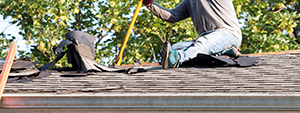
A big part of the problem: Roofing and repair scams that have become increasingly common across the Southeast, especially after stormy weather. Most contractors are honest and reputable, but there are shady storm chasers out there, too. Some may intentionally damage your roof and encourage you to file a claim. Others exaggerate their estimate, leave you with a shoddy, incomplete repair, or take your money without ever starting the job.
Door-to-Door Sales Pitches
A knock at your door may seem innocent enough but be wary of someone who suddenly shows up with a too-good-to-be-true sales pitch to replace your roof. They may explain they are working on other homes in your area with hail or other damage and offer to provide a free inspection. Once on the roof, a fraudster can intentionally damage the roof, photograph it, and present it to you as proof that repairs are needed. Late last year, Florida authorities reported the arrest of four people for allegedly scheming to deliberately damage roofs to file insurance claims. It’s best not to allow someone onto your roof at all unless you have called the contractor directly to request an inspection. If you do allow a contractor onto your roof, make sure you are home to keep an eye on what they are doing.
High-Pressure Tactics
Avoid signing an agreement on the spot for a “today only” deal or without allowing you time to get other estimates. Don’t make cash or up-front payments, and if there’s a no-cost-to-you incentive, this can also be a red flag. It is illegal for a contractor to pay or rebate all or any portion of the homeowner’s insurance deductible.
Don’t rush into choosing a roofing contractor. Ask for references; do your homework to verify they are licensed and have the proper insurance, including workers comp and liability insurance. Get a copy of their business license and tax identification so you can thoroughly research the company.
Homeowner Protections
South Carolina law gives consumers the right to cancel a roofing contract within five days of receiving notice that all or any part of the claim is not covered by an insurance contract. Other provisions include prohibiting up-front payments until the five-day period has expired and preventing roofing contractors from handling the insurance claim on the homeowner’s behalf.
Talk to your Insurance Adjuster
If you suspect your roof may have storm damage, it’s best to call your insurance company first. Claims adjusters are trained to determine the difference between cosmetic damage and damage that will make the roof vulnerable. For example, it is not unusual to find granule loss as part of the normal weathering process for composition shingles. Small hail, rain or wind can displace some granules, but this should not cause concern most of the time. Generally, pea and marble-sized hail will not damage composition shingles that are in good condition.
When a roof has been damaged, the adjuster will point this out. Repairing the roof properly is in your and your insurance company’s best interest. Your insurance company will be the first to encourage you to fix your roof to prevent more costly damage and larger claims down the road. The insurance adjuster will offer an objective evaluation based on how well the roof will protect your home from future loss, while roofing salespeople may only be looking to sell you a new roof.
Also, the adjuster will explain how much coverage is available under your policy if the damage was caused by a covered peril. The amount of coverage will depend on the limits you selected when purchasing the policy and any deductible that applies.
Here to Help
Farm Bureau Insurance® has been in the business of protecting South Carolina homes since 1955. A local Farm Bureau Insurance agent can provide a no-obligation policy review and answer any coverage questions you may have. Find a local agent near you or reach a customer service representative at 1-800-799-7500.
*Coalition Against Insurance Fraud